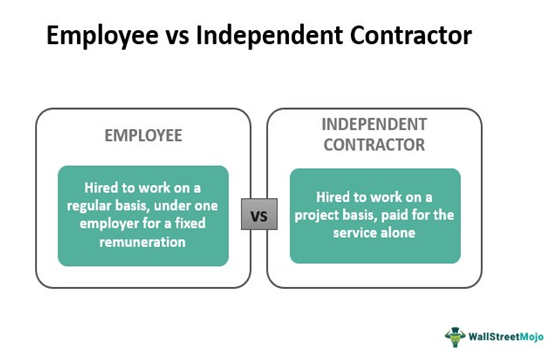Table Of Contents
Difference Between Independent Contractor and Employee
An employee is a person hired by an employer to work for them in exchange for a fixed remuneration. Based on their qualifications and experience, the employer hires an employee to work for them regularly. On the other hand, independent contractors work on a freelance basis, buy their tools, pay their taxes, work however they please, and are paid per project.

Independent Contractor vs Employee Infographics

Comparative Table - Independent Contractor vs Employee
| Particulars | Employee | Independent Contractor |
|---|---|---|
| 1. Payment | Employees receive a regular, fixed payment in a salary or an hourly wage. | Independent contractors are paid per project in the form of a project fee. |
| 2. Benefits | Employees receive various employer-sponsored benefits such as sick leave, paid vacation, health insurance, pension, and severance. | Independent contractors are not eligible for such benefits and are compensated solely through their service fees. |
| 3. Control | The employer can determine the time and place where an employee will do their job. | The employer only controls the outcome of an independent contractor’s work, not the process. |
| 4. Taxation | An employer withholds taxes from an employee’s paycheck to pay the government. | No taxes are withheld from an independent contractor’s fee. Instead, they must pay their own taxes. |
| 5. Equipment | The employer must provide their employees with the tools and equipment needed. | Independent contractors must pay for their tools, equipment, and other work-related expenses. |
| 6. Roster | An employee will usually only work for a single employer at a time. | Independent contractors usually work with multiple clients at a time |
| 7. Permanency | Employees are hired for the long term and may work for their employer until retirement. | Independent contractors are usually hired to do a specific task within a fixed period. |
| 8. Delegation | Employees cannot delegate their work to another individual | Contractors can delegate tasks to others if it is specified under the agreement. |
What Is an Independent Contractor?
An independent contractor is any self-employed individual hired to provide services on a temporary or on-demand basis. They usually work for multiple clients or employers at a time.
- They can set their schedule and work process.
- Independent contractors have to pay for their equipment, office space, and all other work-related expenses.
- They have to pay self-employment taxes on their net income, which is their total income minus any work expenses incurred for a particular period.
- They do not receive a pension, health insurance, paid leave, or other non-monetary employment benefits.
- Employers have to use a different tax framework in most countries when working with independent contractors. For example, in the US, a company has to file forms 1099-MISC and W-9 when hiring independent contractors instead of form W-2 for employees.
- Clients hire independent contractors for some unique skill set they have, which the organization requires temporarily.
- They do not receive any training or material inputs from the clients and practice only a temporary relationship with them.
- They do not perform any tasks or duties specified outside the contract.
- The independenet contractor can delegate their tasks to partners or other subcontractors.
What Is an Employee?
Any worker who earns a fixed salary or wage to work regularly can usually be classified as an employee. Unlike independent contractors, employees work for only one employer at a time.
- The employer can tell the employees when, where, and how they should do their job. For instance, employers can direct their employees to clock in at the office at a particular time. Alternatively, if they’re working remotely, the employer can tell them to log in and log off at a specific time every day.
- An employer must provide the tools and equipment their employees need to do their work. For instance, if an employer hires a graphic designer as a full-time employee, they’d have to pay for the laptop and design software that they use on the job. If they hired the same graphic designer as an independent contractor, the contractor alone would be responsible for such expenses.
- Employers can provide them numerous non-monetary benefits, including paid vacations, sick leave, health insurance, and retirement benefits.
- The employer withholds taxes when paying salaries to their employees.
- Employees receive training from their employer to do their duties and have an ongoing relationship with their employer.
The Importance of Correct Categorization
Employers need to know how to categorize their workers for tax purposes properly. In 2016, ridesharing giant Uber paid about $100 million in the settlement, after class-action lawsuits in California alleging employment misclassification.
There are many advantages and disadvantages to hiring either an employee or an independent contractor. However, ultimately, it is up to the employer to decide who fits their needs and expectations.
